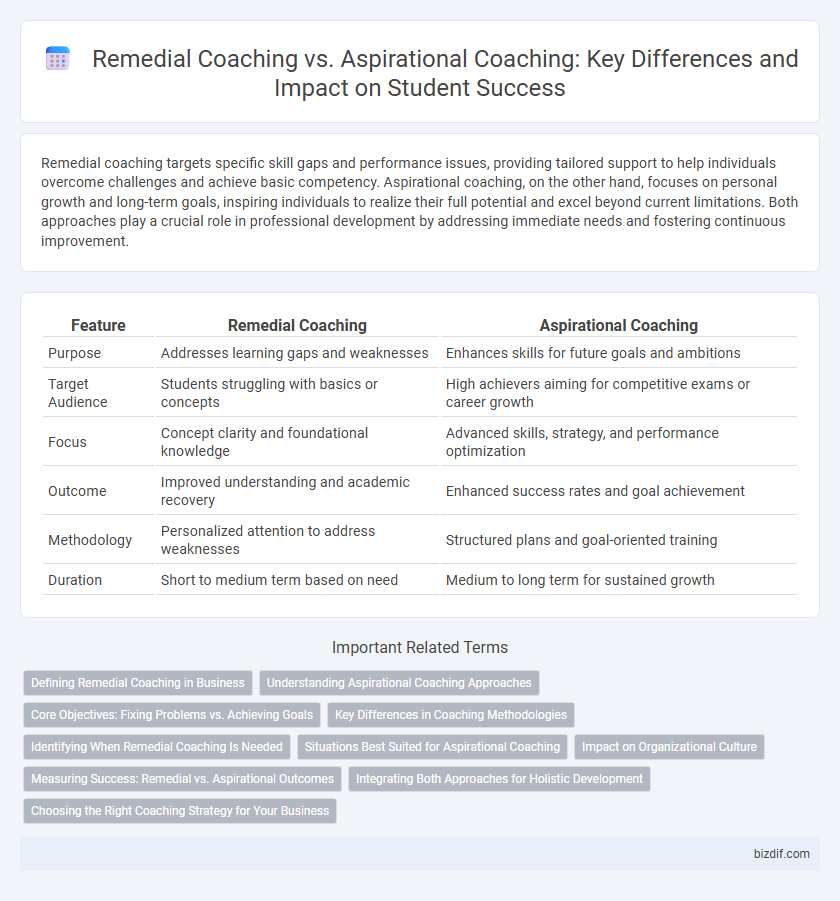Remedial coaching targets specific skill gaps and performance issues, providing tailored support to help individuals overcome challenges and achieve basic competency. Aspirational coaching, on the other hand, focuses on personal growth and long-term goals, inspiring individuals to realize their full potential and excel beyond current limitations. Both approaches play a crucial role in professional development by addressing immediate needs and fostering continuous improvement.
Table of Comparison
| Feature | Remedial Coaching | Aspirational Coaching |
|---|---|---|
| Purpose | Addresses learning gaps and weaknesses | Enhances skills for future goals and ambitions |
| Target Audience | Students struggling with basics or concepts | High achievers aiming for competitive exams or career growth |
| Focus | Concept clarity and foundational knowledge | Advanced skills, strategy, and performance optimization |
| Outcome | Improved understanding and academic recovery | Enhanced success rates and goal achievement |
| Methodology | Personalized attention to address weaknesses | Structured plans and goal-oriented training |
| Duration | Short to medium term based on need | Medium to long term for sustained growth |
Defining Remedial Coaching in Business
Remedial coaching in business focuses on identifying and addressing specific performance gaps or skill deficits within employees or teams to restore expected competency levels. It involves targeted interventions, such as personalized training plans and feedback sessions, designed to correct underperformance and ensure alignment with organizational standards. This approach is essential for maintaining operational efficiency and fostering employee development by resolving immediate challenges hindering productivity.
Understanding Aspirational Coaching Approaches
Aspirational coaching emphasizes growth mindset techniques, goal-setting strategies, and personalized action plans that inspire clients to surpass current limitations and achieve long-term success. This approach integrates positive psychology principles, focusing on strengths, motivation, and future possibilities rather than solely correcting weaknesses as seen in remedial coaching. Coaches utilize motivational interviewing and visioning exercises to help clients clarify values and unlock their highest potential.
Core Objectives: Fixing Problems vs. Achieving Goals
Remedial coaching primarily targets identifying and resolving specific weaknesses or performance gaps to restore baseline competencies. Aspirational coaching emphasizes setting and pursuing ambitious goals that drive personal growth and long-term achievement beyond current limitations. Both approaches tailor strategies to individual needs, with remedial focusing on problem-solving and aspirational on goal realization and potential maximization.
Key Differences in Coaching Methodologies
Remedial coaching centers on addressing specific gaps and weaknesses in a learner's current knowledge or skills through targeted interventions and corrective feedback. Aspirational coaching emphasizes goal-setting, motivation, and the development of a growth mindset to help individuals achieve their long-term ambitions and unlock potential beyond immediate deficiencies. Methodologically, remedial coaching uses diagnostic assessments and structured practice, while aspirational coaching relies on reflective techniques, vision-building exercises, and personalized action plans.
Identifying When Remedial Coaching Is Needed
Remedial coaching is essential when employees consistently underperform, struggle to meet basic job requirements, or exhibit gaps in foundational skills that hinder productivity. Indicators such as frequent errors, missed deadlines, and low confidence levels signal the need for targeted intervention to address specific deficiencies. Identifying these signs early enables managers to implement remedial coaching strategies that restore competence and build a solid skill base.
Situations Best Suited for Aspirational Coaching
Aspirational coaching is best suited for individuals seeking personal growth, career advancement, or skill development beyond their current capabilities. It thrives in situations where clients have clear goals and a strong motivation to achieve higher performance or leadership roles. This type of coaching fosters long-term success by focusing on unlocking potential rather than merely fixing immediate problems.
Impact on Organizational Culture
Remedial coaching addresses skill gaps and performance issues, fostering a culture of continuous improvement and accountability within the organization. Aspirational coaching encourages visionary thinking and leadership development, driving innovation and a growth mindset across teams. Integrating both approaches enhances employee engagement and aligns individual goals with the organization's strategic direction.
Measuring Success: Remedial vs. Aspirational Outcomes
Measuring success in remedial coaching centers on closing gaps in knowledge and improving specific skill deficits, often quantified through standardized test scores and immediate performance improvements. Aspirational coaching evaluates progress based on goal attainment, personal growth, and long-term achievement metrics such as career advancement, leadership development, and sustained motivation. Data-driven assessments, like pre- and post-coaching evaluations, help differentiate outcomes by tracking both remedial recovery and aspirational milestones.
Integrating Both Approaches for Holistic Development
Remedial coaching targets specific gaps and weaknesses to bring learners up to standard, while aspirational coaching focuses on unlocking potential and setting future goals. Integrating both approaches creates a comprehensive framework that addresses immediate needs and fosters long-term growth, enhancing overall learner performance. This holistic development strategy improves skill mastery, motivation, and confidence by balancing remediation with aspirational challenges.
Choosing the Right Coaching Strategy for Your Business
Remedial coaching targets immediate skill gaps and performance issues, making it ideal for businesses facing urgent operational challenges or employee development needs. Aspirational coaching focuses on long-term growth, leadership development, and unlocking potential, suited for organizations aiming to innovate or scale sustainably. Selecting the right coaching strategy involves assessing current organizational goals, employee readiness, and desired outcomes to ensure alignment with business objectives.
Remedial Coaching vs Aspirational Coaching Infographic

 bizdif.com
bizdif.com